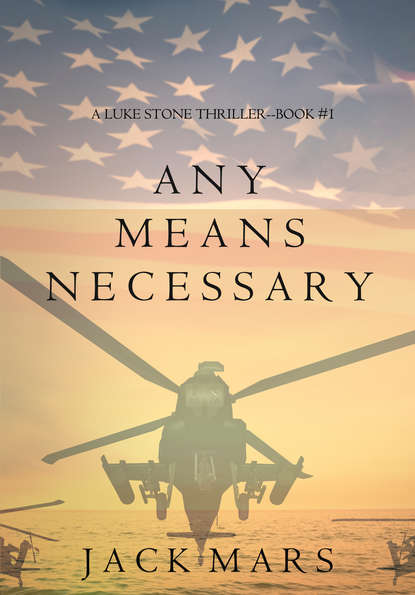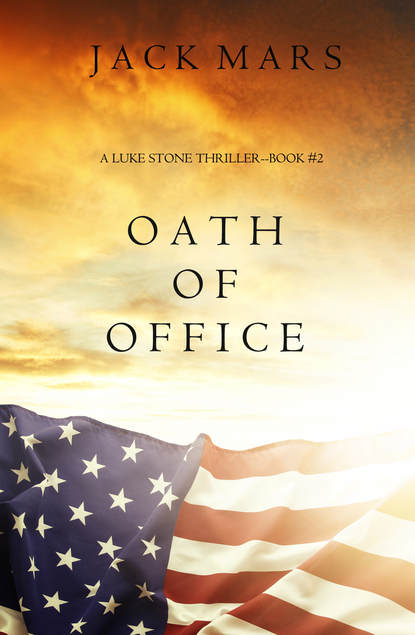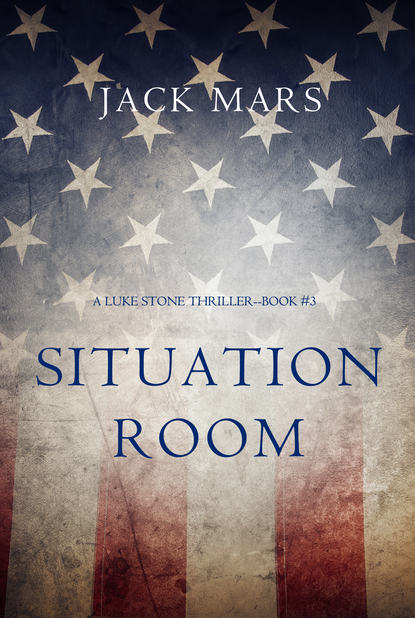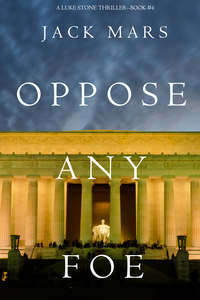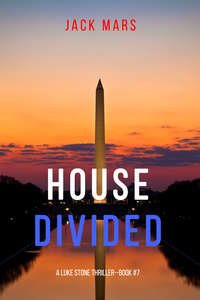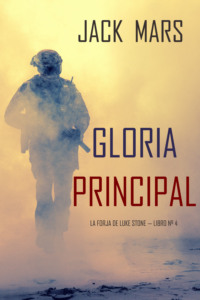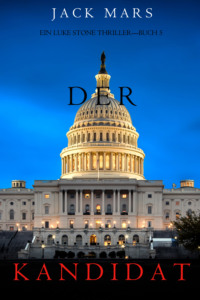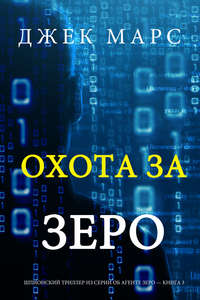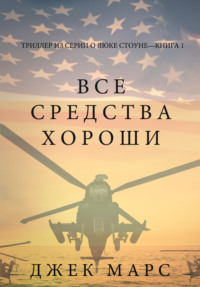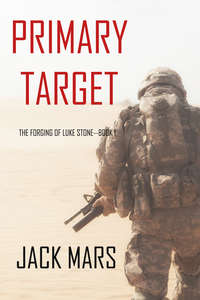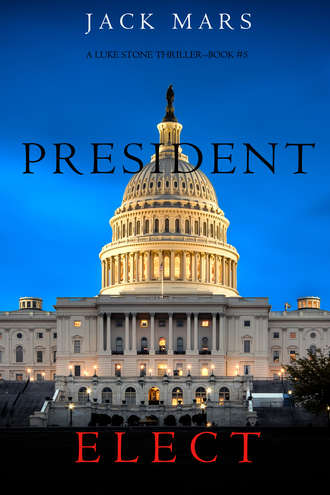
Полная версия
President Elect

Jack Mars
President Elect
Jack Mars is author of the bestselling LUKE STONE thriller series, which include the suspense thrillers ANY MEANS NECESSARY (book #1), OATH OF OFFICE (book #2), SITUATION ROOM (book #3), OPPOSE ANY FOE (book #4), PRESIDENT ELECT (book #5), and OUR SACRED HONOR (book #6).
Jack loves to hear from you, so please feel free to visit www.Jackmarsauthor.com to join the email list, receive a free book, receive free giveaways, connect on Facebook and Twitter, and stay in touch!
Copyright © 2017 by Jack Mars. All rights reserved. Except as permitted under the U.S. Copyright Act of 1976, no part of this publication may be reproduced, distributed or transmitted in any form or by any means, or stored in a database or retrieval system, without the prior permission of the author. This ebook is licensed for your personal enjoyment only. This ebook may not be re-sold or given away to other people. If you would like to share this book with another person, please purchase an additional copy for each recipient. If you’re reading this book and did not purchase it, or it was not purchased for your use only, then please return it and purchase your own copy. Thank you for respecting the hard work of this author. This is a work of fiction. Names, characters, businesses, organizations, places, events, and incidents either are the product of the author’s imagination or are used fictionally. Any resemblance to actual persons, living or dead, is entirely coincidental. Jacket image Copyright Keith Lamond, used under license from Shutterstock.com.
CHAPTER ONE
November 2
2:35 a.m. Eastern Standard Time
Near the Tidal Basin – Washington DC
“Okay,” the man said, his breath drifting away in plumes of white. “What are we doing here?”
It was late, and the night was chilly with a light rain falling.
The man’s name was Patrick Norman, and he was talking to himself. He was an investigator, a man accustomed to spending long periods of time alone. Talking to himself was part of the job.
He stood on the concrete path along the water’s edge. There was no one else around. A moment ago, what looked like a homeless man had been sprawled under some newspapers on a bench about fifty yards away. Now that man was gone, and the newspapers were all over the wet ground.
From where Norman was, he could see the Lincoln Memorial far to his right. Directly in front of him and across the tidal basin was the dome of the Jefferson Memorial, lit up in shimmering blue and green. Lights glinted on the water.
Norman had been in this line of work a long time, and these were the kinds of meetings he relished. Late at night, in a secluded place, with someone who was hiding their identity – risky, but this exact type of thing had paid off for him in the past. If it hadn’t, he wouldn’t be here now.
A man slowly walked along the path toward him. The man was tall, wearing a long raincoat and a wide-brimmed hat pulled down over his face. Norman watched the man approach.
Suddenly, there was movement behind him. Norman turned, and two more men were there. One of them was the homeless man from before. He was black, in ripped workpants and a heavy winter parka. The parka was wet and stained and dirty. The man’s hair stood up in odd tufts and curls on the very top of his head. The second man was just another nondescript nobody in a raincoat and hat. He had a bushy black mustache – if Norman had to describe him later that was the best he was going to do. He was too startled at the moment to absorb a lot of details.
“Can I help you gentlemen?” Norman said.
“Mr. Norman,” the tall man said from behind him. The man had a very deep voice. “I think I’m the one you want to speak with.”
Norman felt his shoulders sag. They were playing a game. If these men wanted to hurt him, they probably would have already done so. That relieved him a little – these were government people. Spooks. Spies. Intelligence operatives, they would probably call themselves. That also annoyed him a little. There was no mysterious source with information for him. These guys had dragged him out here in the middle of a rainy night to tell him… what?
They were wasting his time.
Norman turned around again to face the man. “And you are?”
The man shrugged. A smile showed just below the shadow from his hat. “It doesn’t matter who I am. It matters who I work for. And I can tell you my bosses are not pleased with the caliber of your work.”
“I’m the best there is,” Norman said. He said it without hesitating. He said it because he believed it. Much was open for debate. But one thing that was never called into question was the quality of the job he did.
“That’s what they believed, too, when they hired you. I think you’ll agree they’ve been patient. They’ve been paying you for a year with no results. But suddenly, all this time has passed, and it’s very late in the game. They’re forced to go in another direction, one they had hoped not to take. The election is five days from now.”
Norman shook his head. He raised his hands, palms upward, at his sides. “What can I tell you? They wanted me to find evidence of corruption, and I looked. There isn’t any. She may be many things, but corrupt isn’t one of them. She has no ties to her husband’s business interests, formal or informal. Her husband no longer even manages the day-to-day affairs of his company, and the company has no government contracts, here or anywhere else. All of her premarital assets are managed in a blind trust, with no input from her – a measure she took when she first won a seat in the Senate fifteen years ago. There’s no evidence of pay-offs of any kind, not even a hint or a rumor.”
“So you failed to find anything?” the man said.
Norman nodded. “I failed to – ”
“You failed, in other words.”
A flicker of light appeared inside Norman’s mind, something he hadn’t considered because it had never been asked of him before.
“They wanted me to find something,” he said. “Whether it was there or not.”
The men around him said nothing.
“If that was the case, why didn’t they just tell me so from the beginning? I would have told them to stuff it, and we never would have had this misunderstanding. If you want to invent bad news, don’t hire an investigator. Hire a publicist.”
The man just stared at him. His silence, and the silence of his two henchmen, was unnerving. Norman felt his heart begin to pick up the pace. His body trembled the slightest amount.
“Are you afraid, Mr. Norman?”
“Of you? Not a chance.”
The man glanced at the two men behind Norman. They grabbed Norman without a word, each putting a painful armbar move on him, one on either side. They wrenched his arms backward behind his back and forced him to his knees. The wet grass instantly soaked through his pant legs.
“Hey!” he shouted. “Hey!”
Shouting was an old escape technique he had learned in a self-defense class many years before. It had come in handy a couple of times. When under attack, scream as loud as you possibly can. It startles the attacker, and often brings people running. No one expects it because regular people rarely raise their voices. Most victims never do. It was a painful truth – many people in this world had been mugged or raped or murdered because they were too polite to scream.
Norman gathered his air for the loudest shriek of his lifetime.
The man wrenched Norman’s head upward by the hair and stuffed a rag in his mouth. It was a big rag, wet and dirty with oil or gasoline or some other noxious substance, and the man rammed it in there deep. It took the man several violent thrusts to push it all the way in. Norman couldn’t believe how deep it went, and how it filled his entire mouth. His jaws opened as wide as they would go.
He couldn’t force the rag back out. The foul smell of it, the taste, made Norman gag. His throat worked. If he vomited, he was going to choke to death.
“Guh!” Norman said. “Guh!”
The man slapped Norman across the side of his head.
“Shut up!” he hissed.
The man’s hat had fallen from his head. Now Norman could see his fierce and dangerous blue eyes. They were eyes without pity. They were also without anger. Or humor. They betrayed no emotion of any kind. From inside his coat, he pulled a black gun. A second later, he pulled out a long silencer. Slowly, carefully, in no rush at all, he screwed the silencer onto the barrel of the gun.
“Do you know,” he said, “what this gun will sound like when it goes off?”
“Guh!” Norman said. His whole body shook uncontrollably. His nervous system had gone haywire – so many messages flooding it at once, trying to move through the infrastructure, that he was frozen in place. All he could do was shake.
For the first time, Norman noticed that the man was wearing black leather gloves.
“It will sound like someone coughed. That’s the way I usually think of it. Someone coughed, one time, and tried to do it quietly so as not to disturb anyone else.”
The man pressed the gun to the left side of Norman’s head.
“Good night, Mr. Norman. I’m sorry you didn’t get the job done.”
* * *The man gazed down at what remained of Patrick Norman, former independent investigator. He had been a tall, thin man wearing a gray trench coat with a blue suit underneath. His head was ruined, the right side blown out in a large exit wound. Blood was pooling around the head on the wet grass and running onto the path. If the rain kept up, the blood would probably just wash away.
But the body?
The man handed the gun to one of his assistants, the one who had pretended to be homeless earlier this evening. The homeless man, also wearing gloves, crouched by the body and pressed the gun into the right palm of the dead man. Meticulously, he pressed each one of Norman’s fingers onto the gun in various places. He dropped the gun about six inches from the body.
Then he stood and shook his head in sadness.
“A pity,” he said in a Londoner accent. “Another suicide. I suppose he found his work stressful. So many setbacks. So many disappointments.”
“Will the police believe it?”
The Englishman offered a ghost of a smile.
“Not a chance.”
CHAPTER TWO
November 8
3:17 a.m. Alaska Time (7:17 a.m. Eastern Standard Time)
Slopes of Mount Denali
Denali National Park, Alaska
Luke Stone did not move at all.
He crouched perfectly still on a rooftop, behind a low stairwell outbuilding made of slapped together cement. The night was warm and heavy – hot enough that the sweat had soaked through his clothes. He breathed deeply, his nostrils flaring, but he did not make a sound. His heart beat inside his chest, slow but hard, like a fist pounding rhythmically on a door.
Boom-BOOM. Boom-BOOM. Boom-BOOM.
He peered around the corner of the outbuilding. Across the way, two bearded men waited with automatic rifles on their shoulders. They stood at the building’s parapet, watching the harbor below them. They chatted quietly, laughing about something. One of them lit up a cigarette. Luke reached to his leg and slipped the serrated hunting knife away from the tape holding it to his calf.
As Luke watched, big Ed Newsam appeared, coming into view from the right, walking almost casually.
The big man approached the guards. Now they spotted him. Spotting Ed Newsam was an alarming proposition. Ed put his empty hands in the air, but continued to walk toward them. One of the men growled something in Arabic.
Luke burst around the edge, knife in hand. One second gone. He raced toward the men, his heavy footfalls crunching on the gravel roof. Three seconds, four.
The men heard him, turned to look.
Now Ed attacked, grabbing the closest man by the head, twisting it viciously to the right.
Luke hit his man chest high, knocking him to the rooftop. He landed on top and plunged his knife hard into the man’s breastplate. It punched through on the first try. He clamped a hand over the man’s mouth, feeling the bristles of the man’s beard. He stabbed again and again, in and out, fast, like the piston of a machine.
The man struggled and squirmed, tried to push Luke off, but Luke slapped his hands away and kept jabbing. The knife made a liquid sound each time it penetrated.
The man’s arms drifted down to his sides. His eyes were open, and he was still alive, but the fight had left him.
Finish. Finish it now.
Luke tilted the man’s head up, free hand pressed hard against his mouth again, and swiped the serrated blade across the man’s throat. A jet of blood pulsed out.
Done.
Luke kept his hand pressed against the mouth until the man was gone. He stared up at the black night sky, letting the life quietly ebb from his opponent.
“Look at your man,” Ed’s voice said. “Look!”
“I don’t want to,” Luke said. He just kept staring up at the sky, the great sweep of the Milky Way galaxy filling his vision. Millions of stars were visible. It was… he had no words for it. Beautiful was the only thing that came to mind. He wanted to gaze at those stars forever. He knew what he would see if he looked down – he had looked too many times already.
“You have to look, man,” Ed said softly. “It’s your job to look.”
Luke shook his head. “No.”
But there was no choice. He cast a glance at the body beneath him. The black beard of the jihadi was gone. The rugged face was replaced by the pretty features of a woman. The curly black hair was now long and soft and light brown.
Luke was covering the woman’s mouth with his hands. Her dead blue eyes stared at him, unseeing – the eyes of his wife, Becca.
Ed whispered now. “You did it, man. You killed her good.”
Luke snapped awake.
He sat bolt upright in the deep darkness, his heart hammering in his chest. He was nude, and his body was soaked in sweat. His hair was a long, matted tangle. His blond beard was as thick as that of any Islamic holy warrior. With his hair and his beard, and his weathered skin, he could easily pass for a homeless man.
He was wrapped in a mummy sleeping bag – rated for extreme cold, twenty degrees below zero. Outside his small tent, the wind howled – the tent’s skirt flapped madly, a sound so loud he could barely hear the wind itself. He was alone above 16,000 feet on the western slope of Denali, and the mountain was already deep into its winter. A snowstorm had blown in two days ago, and hadn’t stopped blowing.
He hadn’t had a fire since the storm came in. He hadn’t left the tent except to urinate in forty hours. He was 4,000 feet below the summit, and it looked like he wasn’t going to make it there. Some people might say he wasn’t going to make it anywhere.
He had come up here woefully unprepared – he realized that now. He had brought enough water for four days – it had run out two days ago. He was eating snow and ice for water at this point. That was okay. Worse was food. He had brought a stack of dried meals-ready-to-eat. They were mostly gone now. When the storm came, he had started rationing the food. He was eating less than half the daily calories he needed – luckily, he had barely moved in two days, and was conserving energy.
He hadn’t bothered to bring a camp stove. He didn’t have a radio, so he had no idea what the weather report was. He had choppered in with a private pilot, and hadn’t filed an itinerary with the park service. No one had any idea he was out here but the pilot, and he had told the guy he would call him when he was done.
“Am I trying to kill myself?” he said out loud. He was startled by the sound of his own voice.
He knew the answer. No. Not necessarily. If it happened, okay, but he was not actively trying to die. You might say he was daring it to happen, taking foolish risks, and had been doing so ever since Becca died.
He wanted to live. He just wanted to be better at it. If he couldn’t do that…
He was a failure as a husband. He was a failure as a father. His career was over at forty-one years of age – he had walked away from government work two years ago and hadn’t looked for anything else. He hadn’t checked his bank accounts in a while, but it was reasonable to assume that he was almost out of money. About the only thing he’d ever been any good at was surviving in harsh and unforgiving environments. And killing – he was good at that, too. Otherwise, he had been a total, abject failure.
He could die on this mountain, but the prospect of it held no terror for him.
He was blank, empty… numb.
“Gotta start thinking of a way out of here,” he said, but he was just making conversation – he could leave, or not. It would be an okay place to die, and an easy thing to do. All he had to do was… nothing. Eventually – soon – he would run out of food. Drinking snowmelt wouldn’t sustain him for long. He would become gradually weaker, until it was impossible for him to make it back down the mountain by himself. He would starve. At some point, he would drift off to sleep and never wake up.
How to decide? How to decide?
Abruptly, he shouted, unaware he was going to do it until he did.
“Give me a sign! Show me what to do!”
Just then, his phone did something it hadn’t done in a long time – it rang. The sound made him jump, and his heart skipped a beat. The ringer was on as loud as it would go. The ring tone was a rock song that his son, Gunner, had put on the phone two years before. Luke had never changed it. More than not changing it, he had kept it on purpose. He cherished that song as the last link between them.
He looked at the phone. It reminded him of a living thing, a poisonous viper – you had to be careful how you handled it. He picked it up, glanced at the number, and answered it.
“Hello?”
The sound was garbled. Naturally, the thick tent was blocking the satellite signal. He was going to have to go outside to take this call – not a cheerful thought.
“I have to call you back!” he shouted into the handset.
Even moving quickly, it took several minutes to assemble the layers of clothes he needed and get dressed. It was too cold outside to do it halfway. He unzipped the tent, crawled through the tiny foyer, and pushed out into the weather. The wind and the stinging ice hit his face at once. He’d better make this quick.
He hung a beacon lamp on the tent frame and stumbled away from the noise of the flapping material into deep snow. He carried a powerful flashlight with him, turning back every few feet to mark the location of his camp. There were no lights out here, and visibility was about twenty yards. Snow and ice swirled around him.
He pressed the button to make the call and brought the phone inside the hood of his parka. He stood like a statue, listening to the beeps as the phone shook hands with the satellite and the call tried to go through.
“Stone?” a deep male voice said.
“Yes.”
“Hold for the President of the United States.”
It was a short wait.
“Luke?” a female voice said.
“Madam President,” Luke shouted. He couldn’t help but smile when he did. “It’s been a long time.”
“Much too long,” Susan Hopkins said.
“To what do I owe this honor?”
“I’ve got trouble,” she said. “I need you to come in.”
Luke thought about that for a moment. “Uh, I’m a long way from anywhere right now. It’s going to be a little hard to – ”
“Doesn’t matter,” she said. “Wherever you are, I’ll send a plane. Or a helicopter. Whatever you need.”
“A big friendly Saint Bernard would be good for starters,” Luke said. “With one of those little whiskey kegs around his neck.”
“Done. He’ll bring you a sandwich too, in case you’re hungry.”
Luke nearly laughed. “Hungry is one way to describe it. And when I’m done eating, I really will need that chopper.”
“Also done. Before we hang up, I’ll give you to someone who can take your coordinates and send someone out to get you. We go the extra mile around here. We believe in door-to-door service.”
Luke had to admit he felt a quick flash of relief. Just moments before he had seen no way off this mountain, no second chance at life. Now, he had one. He hadn’t known before whether he’d wanted to die or live – but now he knew for sure. He could tell by the quickening of his blood when she mentioned a way out of here. Intellectually, he still didn’t know, but viscerally, his body told him.
He wanted to live.
Despite all the hell he’d been through, somehow, he wanted to live.
“What’s going on?” Luke said.
She hesitated, and her voice shook the smallest amount. He could hear it even through the wind whipping around him. “Yesterday was Election Day.”
Luke considered that. He had been off the grid for so long, he had no idea what the date was. Somewhere far away, in another world, people still campaigned for office. The wheels of government ground on. There were policies to argue about and important decisions to be made. There was media coverage, and talking heads shouting at each other. He hadn’t thought about any of these things in some time. In fact, he had almost forgotten they existed.
A long pause passed between them.
“Luke,” Susan said. “I lost the election.”
CHAPTER THREE
8:03 a.m. Eastern Standard Time
The Oval Office
The White House, Washington DC
“That evil bastard,” someone in the room said. “He stole it, plain and simple.”
Susan Hopkins stood in the middle of the office and stared at the large flat-panel TV on the wall. She was still numb, almost in shock. Although she watched intently, she was having trouble forming clear thoughts. It was too much to process.
She was very aware of the suit she wore. It was dark blue with a white dress shirt. There was something uncomfortable about it. Once upon a time, it had fit well – in fact, had been tailored to fit her perfectly – but it was clear today that her body was changing. Now the suit hung wrong. The shoulders of the jacket were too loose, the slacks were too tight. Her bra straps pinched the flesh of her back.
Too much late-night food. Too little sleep. Too little exercise.
She sighed heavily. The job was killing her anyway.
Yesterday at this same time, just after the polls opened, she was among the first people in the United States to cast her vote. She had come out of the booth with a big smile on her face and a fist in the air – an image that had been caught by the TV cameras and photographers, and had gone viral all day long. She had ridden a wave of optimism into Election Day, and the polls yesterday morning pegged her support at more than sixty percent of likely voters – a possible landslide in the making.
Now this.
As she watched, her opponent, Jefferson Monroe, took the podium at his headquarters in Wheeling, West Virginia. Although it was eight in the morning, a crowd of campaign workers and supporters were still there. Everywhere the cameras panned in the crowd were tall, red, white, and blue, Abraham Lincoln–style hats – they had somehow become the emblem of Monroe’s campaign. That, and the aggressive signs that had become his campaign’s war cry: AMERICA IS OURS!
Ours? What did that mean? As opposed to who? Who else would it belong to?
It seemed clear: minorities, non-Christians, gay people… you name it. In particular, it was clear it meant Chinese immigrants to America, as well as Chinese-Americans. Just weeks before, the Chinese had threatened to call in their debt and potentially bankrupt the US. This, indeed, had allowed Monroe to ride a wave of Chinese fear in the final days of his election. Monroe thrived on fear – Chinese fear in particular. According to Monroe, these people were acting as a secret cat’s paw for the imperialist ambitions of the government in Beijing, and the Chinese oligarchs who were buying up vast swaths of American real estate and business interests. According to Monroe, if we didn’t get tough, the Chinese would take over America.
His people ate it up.
Jefferson Monroe’s archenemies, and the enemies of his supporters, were the Chinese. The Chinese were America’s great nemesis, and the airhead former fashion model in the White House either didn’t have the eyes to see it, or was a bought and sold Chinese collaborator.




